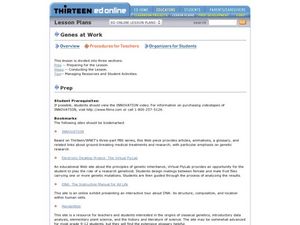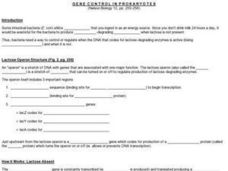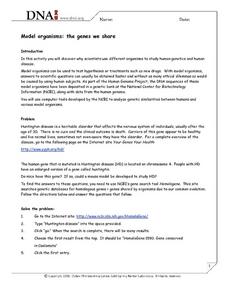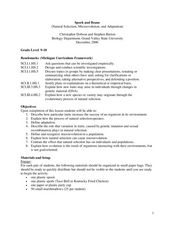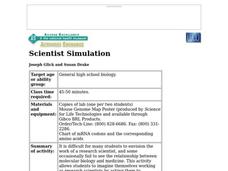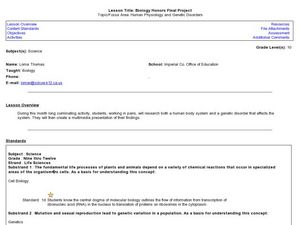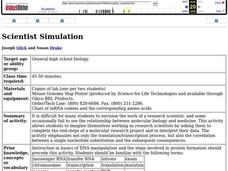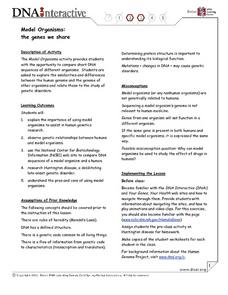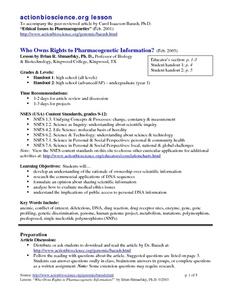Curated OER
Gene Regulation Mechanisms
Young scholars explore genetics. They discuss how chromosomes and/or genes are regulated during the life of an organism. In a lab setting, students compare and contrast the genomic regulation of prokaryotic and eukaryotic cells using...
Curated OER
America's Stone Age Explorers
Students research how mitochondrial DNA is used in determining familial relationships. They complete a worksheet in which they attempt to help solve the identity of bones found in Africa.
Curated OER
Genes at Work
Students explore and discuss genetics stories and answer questions about genetic outcomes of offspring. In this genetics lesson, students read genetics stories on a web site. Students use a chart to answer questions regarding the...
Howard Hughes Medical Institute
Stalking the Genetic Basis of a Trait
Need an a-maize-ing lesson to show your class how regulatory genes work? If you use the well-written resource, they'll be all ears! Biology scholars discover the gene responsible for the evolution of the modern-day corn plant through a...
Serendip
Using Molecular and Evolutionary Biology to Understand HIV/AIDS and Treatment
HIV mutates rapidly, making treatments challenging to find. Scholars learn about why it mutates so quickly and how scientists race to find treatments. The resource approaches the issue from both a molecular and evolutionary perspective...
Curated OER
Pharmaceutical Lesson Plan
Young scholars are able to discuss and prepare a written summary of a scientific article about AIDS. They propose solutions to the opening activity of which drug is more effective in the fight against AIDS.
Curated OER
"Chips" Off the Old Block?
Students study using analogies between common items or occurrences and science concepts. They use the analogy of cookie recipes to that of the DNA "recipes" for living things to help us explain more about mutations.
Curated OER
The Living Environment
Ninth graders study the work of Alice Huang and complete activities on mutations. For this investigative lesson students complete several activities and discuss their findings at the end.
Curated OER
Creative Ways To Teach Evolutionary Concepts
Students explore evolutionary concepts in cartoons and lab activities. They describe and explain evolutionary concepts featured in a cartoon and participate in laboratory activities.
Curated OER
Gene Control in Prokaryotes
In this gene control worksheet, students use the example of the lactose operon structure to describe what happens when this structure is absent or mutated. This worksheet has 21 fill in the blank statements.
Curated OER
Genome Interactions
In this genome interactions worksheet, students read the passage about genome interactions then apply the knowledge to answer several short answer questions.
Curated OER
Blue Genes: Affect Your Life!
Students, in groups, research, analyze and synthesize information on genetic diseases. After watching a video on genetics, groups perform research on a variety of genetic diseases and present their findings to the class.
Curated OER
What Can Pseudogenes Tell Us About Common Ancestry?
Students compare/constrast DNA sequence data for a portion of the rat GULO gene to the corresponding sequence in the inactive GULO gene in humans, chimpanzees, orangutans, and crab-eating macaques by identifying the shared sequences in...
Curated OER
Model Organisms: The Genes We Share
In this genetics activity, students access a website to learn about how human genes mutate to cause heritable disorders such as Huntington disease. Students use the information on this website to complete 12 short answer questions.
Curated OER
No Bigger Than a Minute
Students view a video clip about ideas displayed through images. They work together to analyze paintings and complete activities. They discuss how media representation of an issue can affect one's viewpoint.
Curated OER
Spork and Beans
Students examine natural selection, how it works and how it can cause microevolution. In this evolution lesson students complete a lab activity that shows the effects that natural selection has on organisms.
LABScI
Genetic Equilibrium: Human Diversity
Investigate the Hardy-Weinberg Principle to explain genetic equilibrium. The 10th lesson plan of a series of 12 is a laboratory exploration of genetic equilibrium. Your classes use a mixture of beans to model allele and genotype...
Curated OER
Scientist Simulation
Students imagine themselves working as research scientists completing the end-steps of a molecular research project and interpreting the data. They compare the gene sequences of normal and abnormal mice and evaluate the protein product...
Curated OER
Biology Honors Final Project
Tenth graders work on a project about cellular biology and genetics. In this biology instructional activity, 10th graders research about the assigned human body system and genetic disorders that affect it. They create a multimedia...
Curated OER
Cracking the Code - Cloning Paper Plasmid
Students explore the "genetic code." They observe how genes may be manipulated for genetic research, gene cloning, and genetic engineering. In a lab setting, students examine the mechanics involved in cutting and ligating DNAs into a...
Curated OER
Scientist Simulation
Students envision the work of a research scientist, and the relationship between molecular biology and medicine. This activity allows students to imagine themselves working as research scientists by asking them to complete the end-steps...
Curated OER
Model Organisms: The Genes We Share
Young scholars gather information about gene banks. In this biology lesson, students work in groups to complete an activity sheet about genetic databases and organism genomes. Lesson includes extension ideas.
Curated OER
Gene Regulation Mechanisms
Young scholars explore the control of expression of DNA into proteins which is divided into two main categories: transcriptional and post-transcriptional. They construct examples of the control mechanisms and discuss disease processes...
Curated OER
Who Owns Rights to Pharmacogenetic Information?
Students develop an understanding of the rationale of ownership over scientific information. They research commercial applications of DNA sequences. They analyze how to evaluate medical ethics issues.




